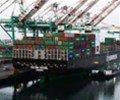

President Joe Biden’s plan to run California ports 24-hours-a-day, seven-days-a-week is redundant if truckers and warehouses aren’t running all night too, a logistics executive said.
In an interview with Bloomberg this week, Brian Bourke, chief growth officer at logistics firm Seko, said that Biden’s new schedule would not fix the supply chain crunch alone.
“That’s not going to solve the issue,” he said, adding that the extra hours were a “drop in the bucket.”
“You can keep the ports open but if there are no trucks coming to pick-up or no warehouses open at 3 a.m., it’s kind of a moot point,” he said.
The global supply chain has been running at peak demand for the past 12 months, Bourke said, as consumers continue to spend money on goods rather than services – a trend that kicked off in the early days of the pandemic when shoppers were stuck at home with disposable cash.
The crisis has clogged up ports off the coast of California, and labor shortages throughout the supply chain are making things worse.
Everybody needs to be in sync to solve the problem, Bourke said. “Everything is connected … that’s why they call it a supply chain,” he said.
Bourke said he felt encouraged by Gov. Gavin Newsom’s executive order that was issued on Wednesday, directing state agencies to hunt down state-owned storage facilities that can be used to house goods that are stuck on ships or in containers on docks.
Newsom is also looking at enforcing new rules that allow trucks to carry more goods at any one time on priority freight routes.
Other supply chain experts have echoed Bourke’s thoughts around the 24-hours-a-day schedule.
“It’s great that they’ve chosen to do something, but we’re talking about a less than 1% to 2% change here,” Brian Whitlock, a supply chain analyst at Gartner, told Insider’s Grace Kay. “The work that they’re talking about here is going to be immaterial. It probably won’t even be visible.”
In an interview with CNN on Monday, Gene Seroka, head of the Port of Los Angeles, said that they had made some progress by adding extra working hours.
“We had 25% of all cargo on our dock sitting here for 13 days or longer [and] that’s been cut in just about half over the last week,” he told CNN.
Demand shows no sign of slowing down. On Monday, the two Southern California ports reached new records, with 100 ships floating at sea around the port, waiting to dock and unload, per Marine Exchange data.
Source: Business Insider